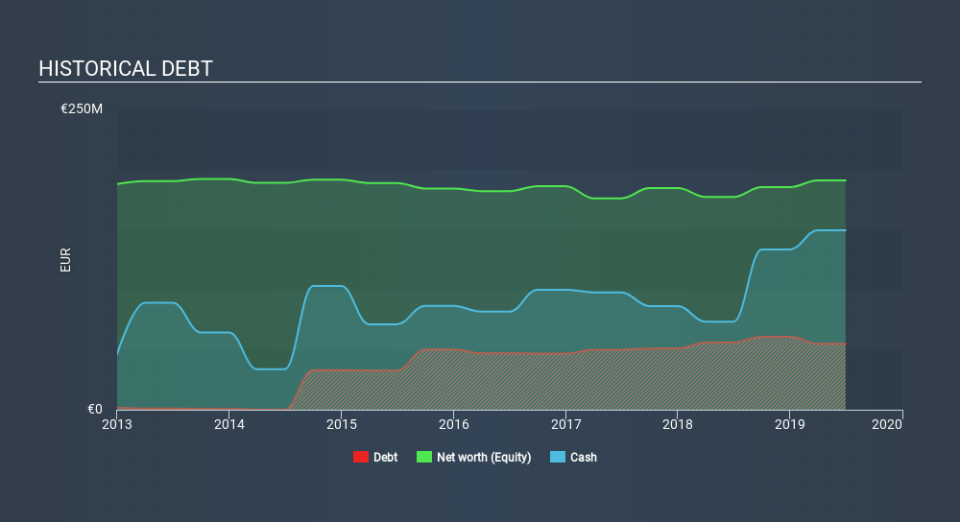Rosetti Marino (BIT:YRM) Seems To Use Debt Rather Sparingly

Warren Buffett famously said, 'Volatility is far from synonymous with risk.' So it might be obvious that you need to consider debt, when you think about how risky any given stock is, because too much debt can sink a company. We can see that Rosetti Marino SpA (BIT:YRM) does use debt in its business. But is this debt a concern to shareholders?
When Is Debt Dangerous?
Debt and other liabilities become risky for a business when it cannot easily fulfill those obligations, either with free cash flow or by raising capital at an attractive price. If things get really bad, the lenders can take control of the business. However, a more common (but still painful) scenario is that it has to raise new equity capital at a low price, thus permanently diluting shareholders. Having said that, the most common situation is where a company manages its debt reasonably well - and to its own advantage. The first step when considering a company's debt levels is to consider its cash and debt together.
Check out our latest analysis for Rosetti Marino
How Much Debt Does Rosetti Marino Carry?
As you can see below, Rosetti Marino had €54.9m of debt, at June 2019, which is about the same the year before. You can click the chart for greater detail. But on the other hand it also has €149.3m in cash, leading to a €94.5m net cash position.
How Strong Is Rosetti Marino's Balance Sheet?
The latest balance sheet data shows that Rosetti Marino had liabilities of €87.8m due within a year, and liabilities of €130.6m falling due after that. On the other hand, it had cash of €149.3m and €115.5m worth of receivables due within a year. So it actually has €46.4m more liquid assets than total liabilities.
This luscious liquidity implies that Rosetti Marino's balance sheet is sturdy like a giant sequoia tree. On this view, it seems its balance sheet is as strong as a black-belt karate master. Succinctly put, Rosetti Marino boasts net cash, so it's fair to say it does not have a heavy debt load!
On top of that, Rosetti Marino grew its EBIT by 92% over the last twelve months, and that growth will make it easier to handle its debt. When analysing debt levels, the balance sheet is the obvious place to start. But ultimately the future profitability of the business will decide if Rosetti Marino can strengthen its balance sheet over time. So if you want to see what the professionals think, you might find this free report on analyst profit forecasts to be interesting.
But our final consideration is also important, because a company cannot pay debt with paper profits; it needs cold hard cash. Rosetti Marino may have net cash on the balance sheet, but it is still interesting to look at how well the business converts its earnings before interest and tax (EBIT) to free cash flow, because that will influence both its need for, and its capacity to manage debt. Over the last two years, Rosetti Marino recorded free cash flow worth a fulsome 99% of its EBIT, which is stronger than we'd usually expect. That puts it in a very strong position to pay down debt.
Summing up
While we empathize with investors who find debt concerning, you should keep in mind that Rosetti Marino has net cash of €94.5m, as well as more liquid assets than liabilities. The cherry on top was that in converted 99% of that EBIT to free cash flow, bringing in €69m. The bottom line is that we do not find Rosetti Marino's debt levels at all concerning. Above most other metrics, we think its important to track how fast earnings per share is growing, if at all. If you've also come to that realization, you're in luck, because today you can view this interactive graph of Rosetti Marino's earnings per share history for free.
At the end of the day, it's often better to focus on companies that are free from net debt. You can access our special list of such companies (all with a track record of profit growth). It's free.
If you spot an error that warrants correction, please contact the editor at editorial-team@simplywallst.com. This article by Simply Wall St is general in nature. It does not constitute a recommendation to buy or sell any stock, and does not take account of your objectives, or your financial situation. Simply Wall St has no position in the stocks mentioned.
We aim to bring you long-term focused research analysis driven by fundamental data. Note that our analysis may not factor in the latest price-sensitive company announcements or qualitative material. Thank you for reading.

